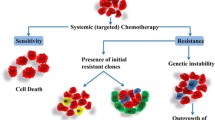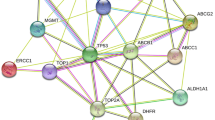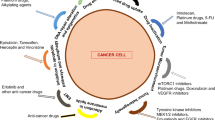Abstract
The high heterogeneity and genomic instability of malignant tumors explains why even responsive tumors contain cell clones that are resistant for many possible mechanisms involving intracellular drug inactivation, low uptake or high efflux of anticancer drugs from cancer cells, qualitative or quantitative changes in the drug target. Many tumors, however, are resistant because of insufficient exposure to anticancer drugs, due to pharmacokinetic reasons and inefficient and heterogeneous tumor drug distribution, related to a deficient vascularization and high interstitial pressure. Finally, resistance can be related to the activation of anti-apoptotic and cell survival pathways by cancer cells and often enhanced by tumor microenvironment.
Similar content being viewed by others
References
Amable L (2016) Cisplatin resistance and opportunities for precision medicine. Pharmacol Res 106:27–36. doi:10.1016/j.phrs.2016.01.001
Ambudkar SV, Kimchi-Sarfaty C, Sauna ZE, Gottesman MM (2003) P-glycoprotein: from genomics to mechanism. Oncogene 22:7468–7485. doi:10.1038/sj.onc.1206948
Ashworth A (2008) Drug resistance caused by reversion mutation. Cancer Res 68:10021–10023. doi:10.1158/0008-5472.CAN-08-2287
Avery-Kiejda KA, Bowden NA, Croft AJ et al (2011) P53 in human melanoma fails to regulate target genes associated with apoptosis and the cell cycle and may contribute to proliferation. BMC Cancer 11:203. doi:10.1186/1471-2407-11-203
Baekelandt MM, Holm R, Nesland JM et al (2000) P-glycoprotein expression is a marker for chemotherapy resistance and prognosis in advanced ovarian cancer. Anticancer Res 20:1061–1067
Bai L, Zhu WG (2006) p53: structure, function and therapeutic applications. J Cancer Mol 2:141–153
Bell DW, Gore I, Okimoto RA et al (2005) Inherited susceptibility to lung cancer may be associated with the T790M drug resistance mutation in EGFR. Nat Genet 37:1315–1316. doi:10.1038/ng1671
Buck A, Halbritter S, Späth C et al (2015) Distribution and quantification of irinotecan and its active metabolite SN-38 in colon cancer murine model systems using MALDI MSI. Anal Bioanal Chem 407:2107–2116. doi:10.1007/s00216-014-8237-2
Cesca M, Morosi L, Berndt A et al (2016) Bevacizumab-induced inhibition of angiogenesis promotes a more homogeneous intratumoral distribution of paclitaxel, improving the antitumor response. Mol Cancer Ther 15:125–135. doi:10.1158/1535-7163.MCT-15-0063
Chen Z, Naito M, Hori S et al (1999) A human IAP-family gene, apollon, expressed in human brain cancer cells. Biochem Biophys Res Commun 264:847–854. doi:10.1006/bbrc.1999.1585
Choi YL, Soda M, Yamashita Y et al (2010) EML4-ALK mutations in lung cancer that confer resistance to ALK inhibitors. N Engl J Med 363:1734–1739. doi:10.1056/NEJMoa1007478
Connell JJ, Sugihara Y, Török S et al (2015) Localization of sunitinib in in vivo animal and in vitro experimental models by MALDI mass spectrometry imaging. Anal Bioanal Chem 407:2245–2253. doi:10.1007/s00216-014-8350-2
Croce CM, Reed JC (2016) Finally, an apoptosis-targeting therapeutic for cancer. Cancer Res 76:5914–5920. doi:10.1158/0008-5472.CAN-16-1248
Di Nicolantonio F, Mercer SJ, Knight LA et al (2005) Cancer cell adaptation to chemotherapy. BMC Cancer 5:78. doi:10.1186/1471-2407-5-78
Farmer H, McCabe N, Lord CJ et al (2005) Targeting the DNA repair defect in BRCA mutant cells as a therapeutic strategy. Nature 434:917–921. doi:10.1038/nature03445
Fink D, Aebi S, Howell SB (1998) The role of DNA mismatch repair in drug resistance. Clin Cancer Res 4:1–6
Fuso Nerini I, Morosi L, Zucchetti M et al (2014) Intratumor heterogeneity and its impact on drug distribution and sensitivity. Clin Pharmacol Ther 96:224–238. doi:10.1038/clpt.2014.105
Garraway LA, Jänne PA (2012) Circumventing cancer drug resistance in the era of personalized medicine. Cancer Discov 2:214–226. doi:10.1158/2159-8290.CD-12-0012
Giordano S, Morosi L, Veglianese P et al (2016a) 3D mass spectrometry imaging reveals a very heterogeneous drug distribution in tumors. Sci Rep 6:37027. doi:10.1038/srep37027
Giordano S, Zucchetti M, Decio A et al (2016b) Heterogeneity of paclitaxel distribution in different tumor models assessed by MALDI mass spectrometry imaging. Sci Rep 6:39284. doi:10.1038/srep39284
Gorre ME, Mohammed M, Ellwood K et al (2001) Clinical resistance to STI-571 cancer therapy caused by BCR-ABL gene mutation or amplification. Science 293:876–880. doi:10.1126/science.1062538
Holohan C, Van Schaeybroeck S, Longley DB, Johnston PG (2013) Cancer drug resistance: an evolving paradigm. Nat Rev Cancer 13:714–726. doi:10.1038/nrc3599
Kao CH, Tsai SC, Liu TJ et al (2001) P-glycoprotein and multidrug resistance-related protein expressions in relation to technetium-99m methoxyisobutylisonitrile scintimammography findings. Cancer Res 61:1412–1414
Kauvar LM, Morgan AS, Sanderson PE, Henner WD (1998) Glutathione based approaches to improving cancer treatment. Chem Biol Interact 111–112:225–238
Kirschner K, Melton DW (2010) Multiple roles of the ERCC1-XPF endonuclease in DNA repair and resistance to anticancer drugs. Anticancer Res 30:3223–3232
Leith CP, Kopecky KJ, Chen IM et al (1999) Frequency and clinical significance of the expression of the multidrug resistance proteins MDR1/P-glycoprotein, MRP1, and LRP in acute myeloid leukemia: a southwest oncology group study. Blood 94:1086–1099
Longley DB, Harkin DP, Johnston PG (2003) 5-fluorouracil: mechanisms of action and clinical strategies. Nat Rev Cancer 3:330–338. doi:10.1038/nrc1074
Meijer C, Mulder NH, Timmer-Bosscha H et al (1992) Relationship of cellular glutathione to the cytotoxicity and resistance of seven platinum compounds. Cancer Res 52:6885–6889
Minchinton AI, Tannock IF (2006) Drug penetration in solid tumours. Nat Rev Cancer 6:583–592. doi:10.1038/nrc1893
Morosi L, Zucchetti M, D’Incalci M, Davoli E (2013) Imaging mass spectrometry: challenges in visualization of drug distribution in solid tumors. Curr Opin Pharmacol 13:807–812. doi:10.1016/j.coph.2013.06.003
Pallis M, Russell N (2004) Strategies for overcoming p-glycoprotein-mediated drug resistance in acute myeloblastic leukaemia. Leukemia 18:1927–1930. doi:10.1038/sj.leu.2403511
Poulikakos PI, Persaud Y, Janakiraman M et al (2011) RAF inhibitor resistance is mediated by dimerization of aberrantly spliced BRAF(V600E). Nature 480:387–390. doi:10.1038/nature10662
Prideaux B, Stoeckli M (2012) Mass spectrometry imaging for drug distribution studies. J Proteome 75:4999–5013. doi:10.1016/j.jprot.2012.07.028
Rzagalinski I, Volmer DA (2016) Quantification of low molecular weight compounds by MALDI imaging mass spectrometry – a tutorial review. Biochim Biophys Acta. doi:10.1016/j.bbapap.2016.12.011. pii:S1570-9639(16)30276-X [Epub ahead of print]
Shervington A, Lu C (2008) Expression of multidrug resistance genes in normal and cancer stem cells. Cancer Investig 26:535–542. doi:10.1080/07357900801904140
Sugiura Y, Setou M (2010) Imaging mass spectrometry for visualization of drug and endogenous metabolite distribution: toward in situ pharmacometabolomes. J Neuroimmune Pharmacol 5:31–43. doi:10.1007/s11481-009-9162-6
Szakács G, Paterson JK, Ludwig JA et al (2006) Targeting multidrug resistance in cancer. Nat Rev Drug Discov 5:219–234. doi:10.1038/nrd1984
Thomas H, Coley HM (2003) Overcoming multidrug resistance in cancer: an update on the clinical strategy of inhibiting p-glycoprotein. Cancer Control J Moffitt Cancer Center 10:159–165
Thomas A, Tanaka M, Trepel J et al (2017) Temozolomide in the era of precision medicine. Cancer Res 77:823–826. doi:10.1158/0008-5472.CAN-16-2983
Torok S, Rezeli M, Kelemen O et al (2017) Limited tumor tissue drug penetration contributes to primary resistance against angiogenesis. Inhibitors. Theranostics 7(2):400–412. doi:10.7150/thno.16767
Usanova S, Piée-Staffa A, Sied U et al (2010) Cisplatin sensitivity of testis tumour cells is due to deficiency in interstrand-crosslink repair and low ERCC1-XPF expression. Mol Cancer 9:248. doi:10.1186/1476-4598-9-248
Wong RSY (2011) Apoptosis in cancer: from pathogenesis to treatment. J Exp Clin Cancer Res CR 30:87. doi:10.1186/1756-9966-30-87
Author information
Authors and Affiliations
Corresponding author
Editor information
Editors and Affiliations
Rights and permissions
Copyright information
© 2017 Springer International Publishing AG
About this chapter
Cite this chapter
Colmegna, B., Morosi, L., D’Incalci, M. (2017). Molecular and Pharmacological Mechanisms of Drug Resistance:An Evolving Paradigm. In: Mandalà, M., Romano, E. (eds) Mechanisms of Drug Resistance in Cancer Therapy. Handbook of Experimental Pharmacology, vol 249. Springer, Cham. https://doi.org/10.1007/164_2017_20
Download citation
DOI: https://doi.org/10.1007/164_2017_20
Published:
Publisher Name: Springer, Cham
Print ISBN: 978-3-030-10506-8
Online ISBN: 978-3-030-10507-5
eBook Packages: Biomedical and Life SciencesBiomedical and Life Sciences (R0)




